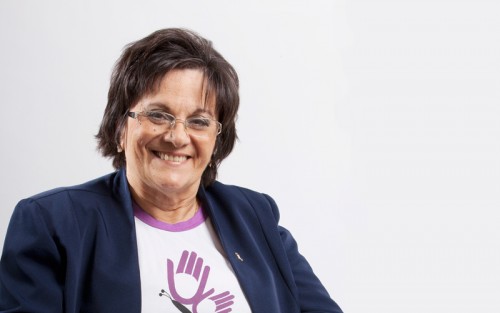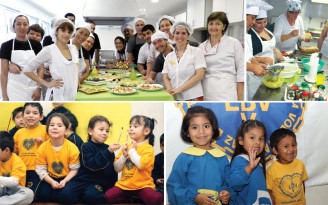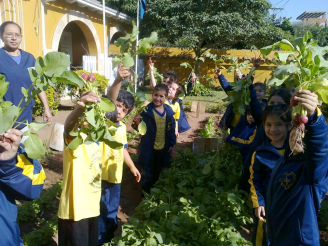
Maria da Penha: an example of courage and perseverance
By the Editorial Staff
Monday | August 04, 2014 | 12:58 PM | Last update: September 22, 2016, 4:07 PM (Brasilia time)

The Law 11.340/06 is today an international landmark when it comes to dealing with domestic and family violence against women. This Brazilian achievement owes a great deal to the strength and courage of the biochemical pharmacist Maria da Penha Maia Fernandes. With perseverance, this native of the state of Ceará, born in 1945, changed her own destiny and, through her example, that of thousands of other women who are protected by the law that carries her name. In the city of Fortaleza, where she lives, she received the staff of GOOD WILL magazine to give an interview about her story of struggle and the progress of the pioneering law that fights gender violence.
GOODWILL — Six years after the Maria da Penha Law was passed, what can we celebrate?
Maria da Penha — Society is taking over this law. It knows that it is here to protect women from domestic violence, to prevent it, and to punish the aggressors. What is needed is a larger number of women’s police stations, reference centers to attend to women in a situation of domestic violence, and shelters for women who are unable to go back home because they might be killed. Besides women’s courts, which we need a larger number of, we also need to speed up lawsuits and to mete out justice, but not like it happened in my case, which took 19 years and 6 months to happen.
GW — This story happened almost 30 years ago…
Maria da Penha — I met my aggressor when I was doing my master’s degree at the University of São Paulo [USP]. He was a Colombian student that came to USP to do a specialization course and he was well regarded in my group of friends (…). When I returned to Fortaleza, after completing my master’s degree, he went along with me. It just so happened that during this time I had a daughter with him; that was when he managed to acquire Brazilian nationality. As soon as he got this guarantee, he showed his true nature.
GW — How did your cry for help come about?
Maria da Penha — In May 1983, I was sleeping when I heard a shot… a very loud noise in the bedroom. I tried to move, but I couldn’t any more. And the version my ex-husband told the police and the neighbors was that four thieves had broken into our house and that he had fought them off. I became paraplegic, and spent four months in the hospital. Then I returned home, because at first I didn’t know he had been the shooter. That was when he kept me in forced confinement at home for more than fifteen days. (…) I couldn’t continue with that relationship, but I needed legal documentation, something called a legal separation, in order to leave home taking my daughters with me, because otherwise I might lose their custody. With the document I was able to leave with my daughters and I returned to my parents’ house.
GW — And after that did it become possible to investigate the case?
Maria da Penha — From May until December [1983] all that happened. In January 1984 the State Security Secretariat resumed the process and called him in unexpectedly for a new testimony. He couldn’t remember any more what he had said before, and started contradicting himself. In the end, the police indicted him for attempted murder. That was when my great fight for justice began, and my aggressor was only arrested as a result of international pressure. The first trial only took place eight years after the event. He was convicted, but left the courthouse freely thanks to a legal recourse. He was then submitted to a jury and, having again been convicted, he now got out thanks to procedure delay. When he was finally arrested, there were only six months left before the crime would have become time-barred.
GW — Where did you get support from?
Maria da Penha — I decided to write a book [Sobrevivi... posso contar (I survived… I can tell my story)] about this story and all the contradictions in the legal proceedings. This work, thanks to God’s will, reached two Brazilian NGOs: CLADEM (The Latin American and Caribbean Committee for the Defense of Women’s Rights) and CEJIL (Center for Justice and International Law), which invited me to denounce Brazil to the Inter-American Commission on Human Rights of the Organization of American States (OAS).
GW — The LBV addresses the subject of violence against women in campaigns and socio-educational programs and in the educational content of its network of schools...
Maria da Penha — I congratulate the LBV because I think that education changes everything. If you educate children, our society becomes much better. I have no doubt about this. I’m happy to record a program*¹ that will reach thousands and thousands of people, and not only women, but men, adolescents, and children as well. We can only have a Culture of Peace in the world and in our city if we develop it within the home. I’m always at your disposal to give information about the Maria da Penha Law. (…) I want to congratulate the LBV’s school! The subject Coexistence*² is very interesting.
+ The creation of the law
+ LBV: education as a means of confronting discrimination and violence against women
_____________________________________
*¹ Refers to a recent interview granted to the Super Good Will Communication Network (radio, TV, Internet, and publications).
*² The subject Coexistence, created by educator Paiva Netto, invites students to research and discuss important everyday issues, such as domestic violence and what the Maria da Penha Law determines.


